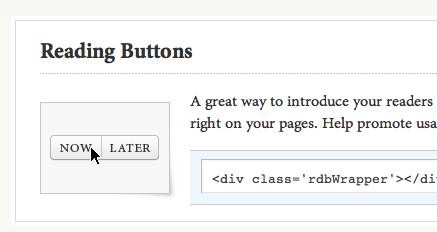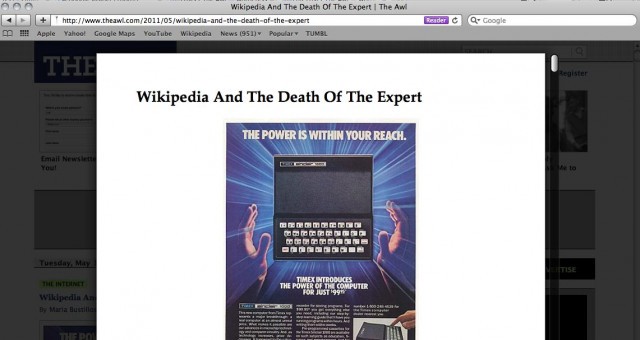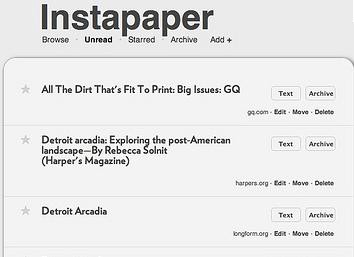"Read It Later": Republishing is Theft

Yesterday Apple introduced a new version of Safari, along with a ton of other stuff, and it has something they call Reader. Some time back, we’d all heard that Apple was getting into the game, with what people were calling “Reading List,” which would let you “collect webpages.” This language was suspicious and largely wrong. What Reader does is pop up a nice, easy-readin’ overlay over the website you’re “at,” allowing you to read without distraction — and also to print it or to email it to a friend. It deals with pagination really well; it looks great, and it makes sense.
Its sensible structure is, at least in part, I imagine, because Apple has lawyers. And because big companies are risk adverse, and they know what theft is.
And it does make things read real nice.

Other services in this new and crowded space are sensibly unthreatened by Apple’s rollout. There’s a lot of words on the Internet, so there’s room for a lot of tools to read. But not all these tools operate the same.
There’s Readability, which passes something along: “70% of all membership fees go directly to the publishers and content creators in your reading list,” they say. People like this: “the best part is that Readability divides up the lion’s share of your monthly fee and gives it to the publishers whose content you’re reading. So you get ad-free clean reading from all over the web, while the content can still be self funding.”
The big jump in thinking there is “self funding.” $3.50 each month, divided among everyone on everyone’s “reading list”… that’s not a replacement for advertising-supported publishing. (Readability is still small, as well — the bulk is not there for actual income at this time.)
Readability wants to attract publishers with an appeal to their self-interest: “You can actively promote this revenue channel with our embeddable reading button”!
But it’s not actually a “revenue channel,” except at great bulk (if you had three million readers via Readability, that’d be income, and great for writers). As it stands, it’s a reduction-in-revenue channel.
Yet it’s far more attractive than other options.

There’s Flipboard, which sucks content into an iPad magazine form. Flipboard is much-loved and quite handsome. I like it! They have information for publishers too: “What does Flipboard Pages do for me?” their FAQ asks. Well:
Flipboard has attracted a valuable and high-growth audience of social influencers and enthusiastic readers with one of the most popular apps on the iPad. We believe this more beautiful, more readable layout will increase your viewership and cause more people to retweet, share and like your content. Ultimately, we’d like to help you monetize your content better with the addition of stylish, print magazine-like full-page ads.
You? You get paid in Tweets, baby.

Then there’s Instapaper, the darling of reading services. (Another product I quite like!) It was pointed out early on that Instapaper is, at best, copyright infringement.
Instapaper costs $4.99 for app use, and it’s a “a regular business run by a regular person, so it earns income to cover its costs.” None of those costs are fees to republish in full content published elsewhere, which is exactly what Instapaper does. They do however provide an “opt-out” for publishers: “To opt out, have your site’s legal owner or copyright agent click here to contact Instapaper with the internet domain names of the site(s) you wish to opt out of text-parser compatibility. Please provide contact information for identity verification, including a daytime office phone number.”
They note that no “major publishers” (whatever those are) have yet opted out.
If you become a publisher who opts out of such things, you have foolishly become a Prince Rogers Nelson, serving C&Ds; daily, leaving empty embedded YouTube posts all over the digital world. That’d be dumb! Why not make readers happy? Why not sacrifice some of the money that is coming to writers so readers can be happy? I guess?
If you complained every single time someone decided that an RSS feed was somehow an invitation to republish in full on the web or elsewhere, you’d never have the time to actually help create the material that these people then republish with their own fees and ads. But being put in this situation is particularly cruel, it feels like, to sites that are attempting to prioritize paying writers — something that is a struggle! (And a struggle that will be won, but only after a long time coming.)
I would say that all of these publishers are awesome in many ways at heart! They love reading! They want people reading! And shouldn’t use of these tools be a gift from publishers to eager readers? But also it’s true that some of the proprietors of these services don’t care about the finances of the creation of writing at all. They don’t want to see “all that junk”: they’re hostile; they say things like they don’t see why they should feel personally responsible for someone else’s ad impressions. They just want to reaaaad and be free, man. But they are responsible, if they want people to make words for them. I hope at least they’re downloading someone else’s mp3s to listen to while they’re reading.
